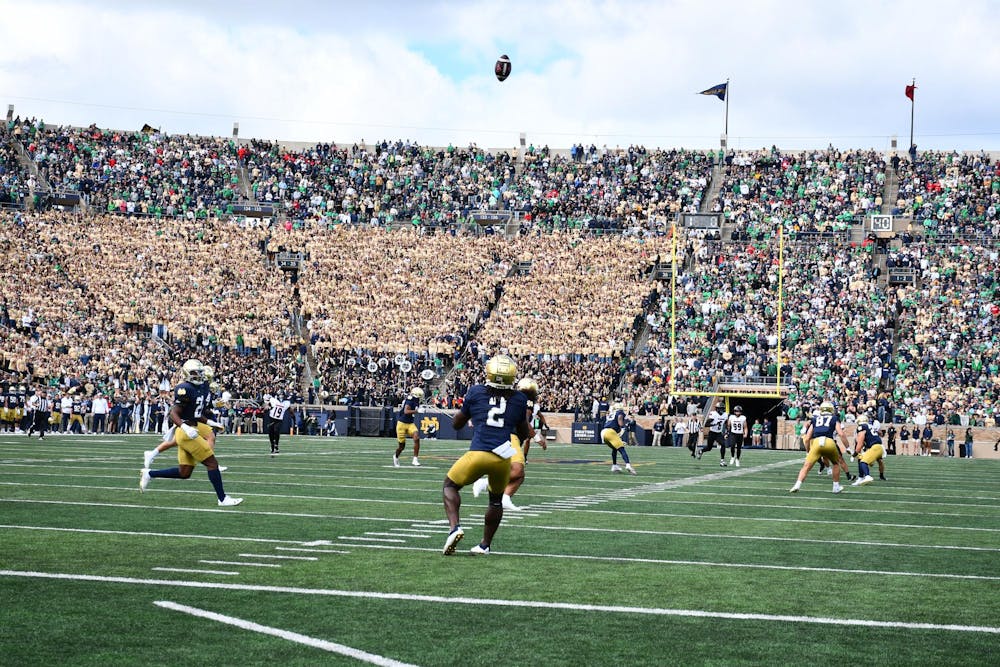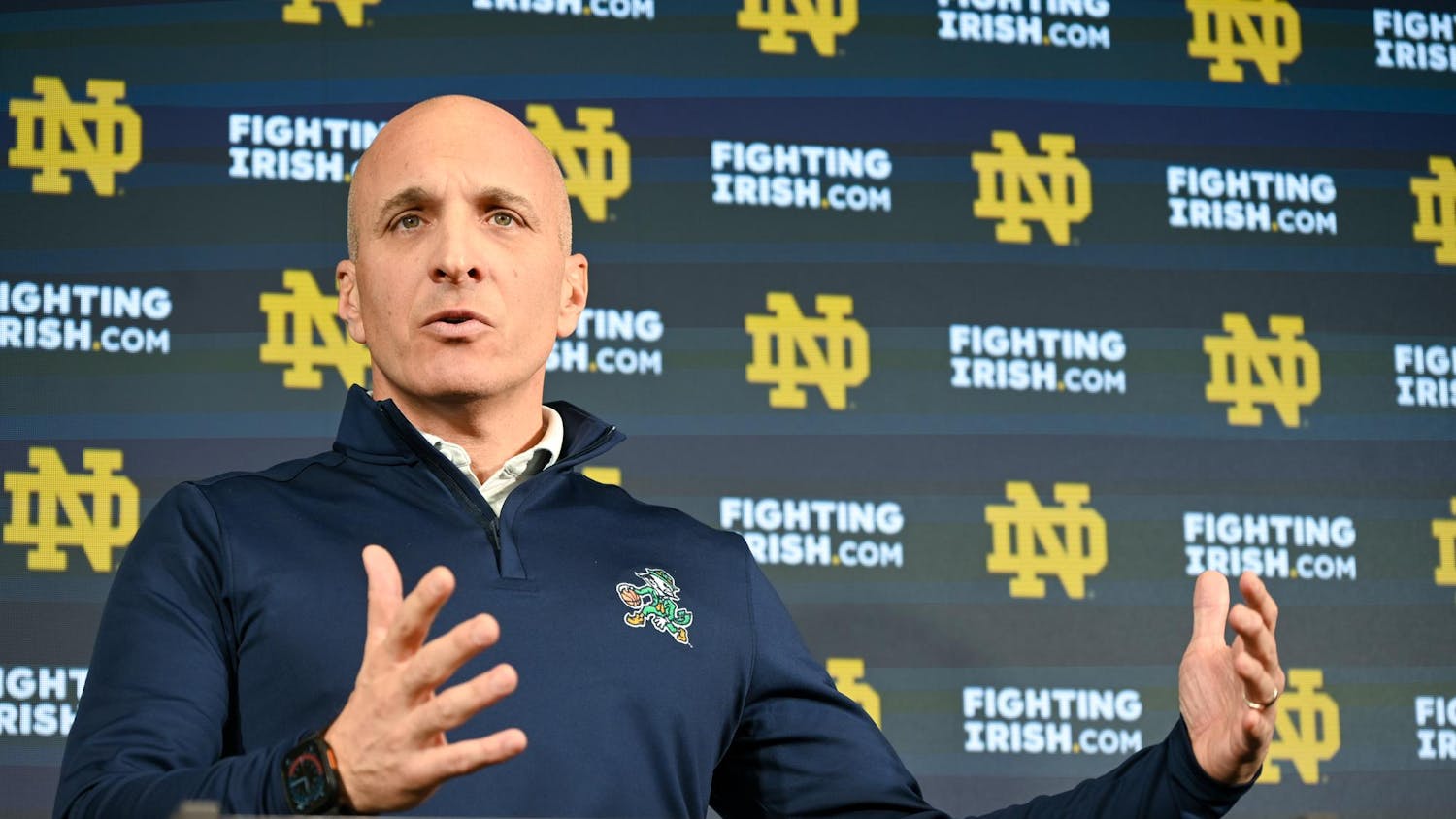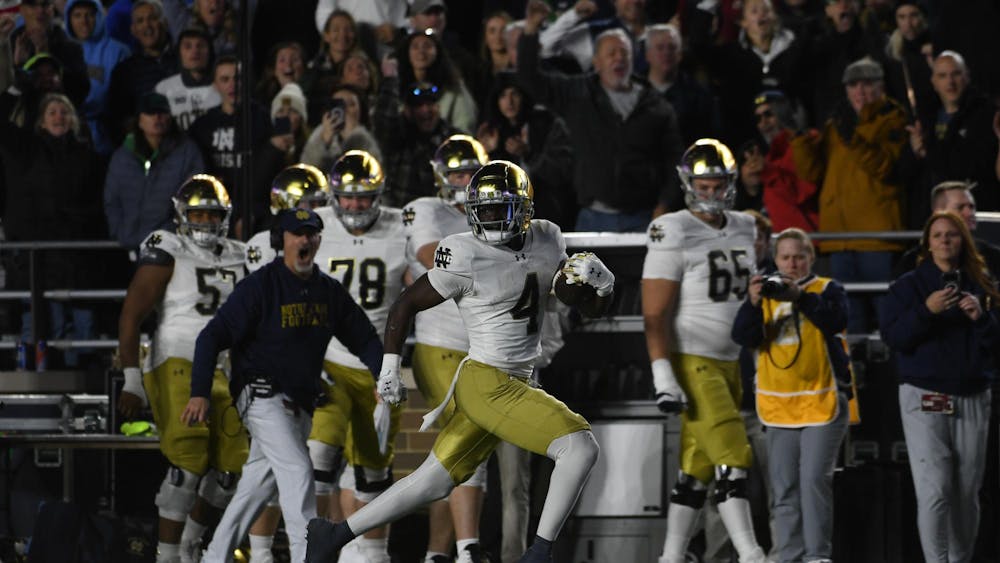Last Monday, I forced myself from the cozy cocoon of blankets on my bed and groggily trekked through construction zones and swarms of students on my way to Nieuwland Science Hall for physics class. I arrived uncharacteristically early and spent the remaining time before lecture discussing Notre Dame’s upset loss to Northern Illinois with a classmate, his voice still hoarse from berating the Irish for their disappointing performance. Knowing my fervor for Notre Dame football, he voiced his surprise that I had not lost my voice, too. As I explained that short-term vocal cord destruction was a non-issue since I watched the game from the press box, I noticed his brow furrowed in confusion. Why on earth would that matter? That’s when I realized that the press box — a home away from home for so many members of the media — is a mysterious place for the vast majority of sports fans.
As a child who grew up idolizing Mitch Albom and Zach Lowe, I romanticized the press box as the sports reporter’s Disneyland, a bustling, passionate environment filled with the heroes I watched on ESPN’s “Around the Horn.” Now that I have realized my dream of spending game day in one of the glass-enclosed palaces at Notre Dame Stadium, I understand how separate the media experience is from the fan experience in the crowd.
I spent the first 58 minutes of game time isolated and insulated from fan reactions, enjoying the Northern Illinois game in its purest form from the best seat in the house. But when the clock stopped for the newly-implemented two-minute timeout, I scrambled from my comfortable reclining chair in a hasty effort to make it down onto the field, to join the crowd before the next play began.
As the service elevator slowly descended nine floors to reach the concourse, I frantically swiped at my phone, constantly refreshing to see the result of this pivotal fourth-and-2 play. A conversion would almost guarantee victory for the Huskies. With the ding of the elevator as my starter’s pistol, I took off toward Section 108. I arrived just in time to momentarily become a fan in the audience, joining in on the shared tension and suspense. Though I couldn’t tell if quarterback Ethan Hampton had made the line to gain on his scramble, the thundering cascade of boos cleared up my uncertainty.
The booing gradually died down, giving way to expletive-laden tirades that grew more profane the closer I got to the field. These spectators, unworthy of being called fans for their perverse language, chastised Marcus Freeman most of all, the man whose visage covered their $8 souvenir sodas.
Now on the field, I watched graduate kicker Mitch Jeter’s 62-yard blocked field goal attempt from behind the opposite end zone. One man, clad in a stitched 2024 Shamrock Series replica jersey, expressed his frustration by spewing some of the most reprehensible slurs towards the Irish players and coaching staff. And no one seemed to care. Such behavior on the street would elicit a glare, confrontation or police involvement, but somehow becomes acceptable within stadium confines.
As the Irish trotted through the tunnel to the locker room, their shoulders slumped and faces expressionless, this man continued his temper tantrum. He swung his fists wildly over the tunnel, his face growing more red with each assertion that he would never watch this team again. But I have no doubt that his eyes will be glued to the TV watching the Irish this Saturday as he continues to give this program his precious time and hard-earned money. At least this time his anger will be directed at a screen.
Before stepping into the postgame press conference, I sneaked one last glance at the renovated Jumbotron and thought back to the pregame hype tape narrated by legendary Irish coach Lou Holtz. I fixated on the video’s end, featuring Holtz’s mic-drop line “We’re Notre Dame, and you ain’t.”
What makes Notre Dame so special and unique? What justifies Holtz’s confident declaration? The answer lies in the University’s Catholic character and adherence to Catholic social teaching, with these guiding principles applied to athletics as well. The football program has closely followed this doctrine, from advocating for social justice with Black Lives Matter to Coach Holtz helping Randy Moss find another collegiate program after becoming ineligible for Notre Dame.
A brief tour of campus furthers this connection. Only at Notre Dame will you find monuments venerating both the teachings of Christ and Rockne, from Touchdown Jesus to First Down Moses to the Holy Handoff. When the opening horns of “Jump Around” are heard over the speakers, Wisconsin students, alumni, and fans come together to shake all of Camp Randall Stadium. Though no other college football tradition compares, Fr. Pete’s promotional video for campus mass elicits the most similar response, cheers erupting from the crowd whenever he appears on the screen.
With Fr. Dowd’s presidential inauguration looming, I am reminded of the theme he chose for the 2024 Notre Dame Forum: What do we owe each other? When considering Notre Dame’s higher moral standards and Catholic values, the answer becomes obvious. We owe each other grace, respect and human dignity. We owe this to ourselves, our family and yes, the Fighting Irish football team.
The magic circle created by sport does not exempt spectators from adhering to the guiding social tenet of personal responsibility, holding themselves accountable for their own actions and exercising self-control. Our personal conduct standards in the way we treat others do not change when we interact with athletes. Fan entitlement has grown out of control. Athletes are not puppets on a string, existing solely for fan entertainment, especially student-athletes. While booing and jeering have always been acceptable means for fans to voice discontent — much to the chagrin of athletes — when those turn into slurs of any kind, personal jabs, or throwing items from the stands, the heckling has gone too far. How would you feel if someone came to your job or classroom and began yelling racial slurs or pouring beer on your head?
Every member of the Notre Dame football team knows the pressure and expectations that come with donning the golden helmet. They can handle the scrutiny and hate. But they shouldn’t have to. Fans enjoy the privilege of watching the dramatic spectacle of the greatest athletes pushing their bodies to the limit in a triumphant display of the indomitable will of the human spirit. If fans want to maintain this privilege to attend games, one that was lost during the COVID-19 pandemic, they must treat athletes with respect.
I know what it feels like to grow overly invested in sports. As a child, I would cry when my March Madness bracket busted. Even now, when my favorite teams lose, I spend the rest of the day feeling disappointed. When Jeter’s kick was blocked, I knew there would be no celebratory postgame rendezvous at the Linebacker Lounge. I knew that my Sunday would be even scarier than usual, with no Irish victory giving me the enthusiasm to tackle another week of grinding through classes and work. But I also knew that I was still responsible for controlling these emotions, not letting them control me. Fans can feel however they want, but they can’t lash out and project their feelings onto others. We must still treat these athletes like humans. If you’re going to buy a ticket to a football game at Notre Dame Stadium, don’t be the fan who ruins the game by hurling hateful words at players or coaches. It’s not cool or clever — it’s embarrassing, harmful and goes against everything Notre Dame stands for as a Catholic institution. It’s our choices that make us who we are. We always have a choice, and we can always choose to do what’s right, a choice to demonstrate why we’re Notre Dame and you ain’t.









